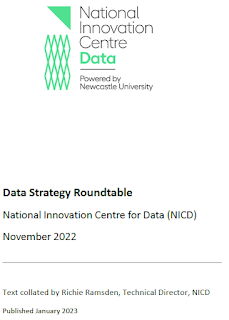The National Innovation Centre for Data has created a new Data Strategy Report, compiled from last year's roundtable discussion. Download the report to read about the areas discussed and insights on the subject of data strategy.
The UK National Data Strategy Missions has 5 pillars which are aided through the new UK bodies that have been established to deal with the pace of change. The pillars are:
- Pillar One: Unlocking the value of data across the economy
- Pillar Two: Securing a trusted and pro-growth data regime
- Pillar Three: Transforming government’s use of data to drive efficiency and improve public services
- Pillar Four: Ensuring the security and resilience of the infrastructure on which data relies
- Pillar Five: Championing the international flow of data
Various questions were considered and the report shares some key messages.
How do you build data strategy from first principles?
Key take home messages
- First step in developing data strategy should be maturity assessment of both data and data capabilities
- Strategy can be defensive (compliance-driven) or offensive (innovation-driven)
- Data strategy can serve business strategy, or may become fully-fledged in its own right
- Data strategy should be iterative
Building a data culture
Key take home messages: Three key points to discuss:
- Ensuring wide ownership and contribution to the organisation
- Avoiding C-suite dominance
- Communicating and adopting data-driven culture within an organisation
To what extent should technology inform data strategy?
Key take home messages:
- Both tech and data strategy should be considered in one holistic approach
- Legacy tech / vendor lock-in should not inform data strategy
- Hierarchy should be communicated: Business -> Data -> Technology
- Data skills are hard to define and understand
- Elements of discovery and iteration are needed
Data strategy on a shoestring
Key take home messages:
- Examine business strategy for data-related objectives to develop data strategy
- Start small and iterate – bias towards action
- Become goal orientated
- Initially pick areas with less uncertainty for good case studies
- Give roles to existing staff members that have an interest in data innovation
- Use free / open-source tools to cut
Sharing data between organisations
A lot of organisations are hesitant to share their data and innovation across organisations has high value
Data skills in business and beyond
Key take home messages:
- There is a need to understand current level of skills and the level of data skills required for the roles.
- There needs to be a connections between business skills and data skills
- Can be business specific, and is business size specific
The discussion outcomes highlighted the need for stronger definitions with maximum value being achieved from development and implementations with
- Structures for Data Strategy development, communication and embedding
- Management tools to help guide users through the Data strategy process and;
- A community to generate, test and disseminate these.
Read the report for more details.

No comments:
Post a Comment
Note: only a member of this blog may post a comment.